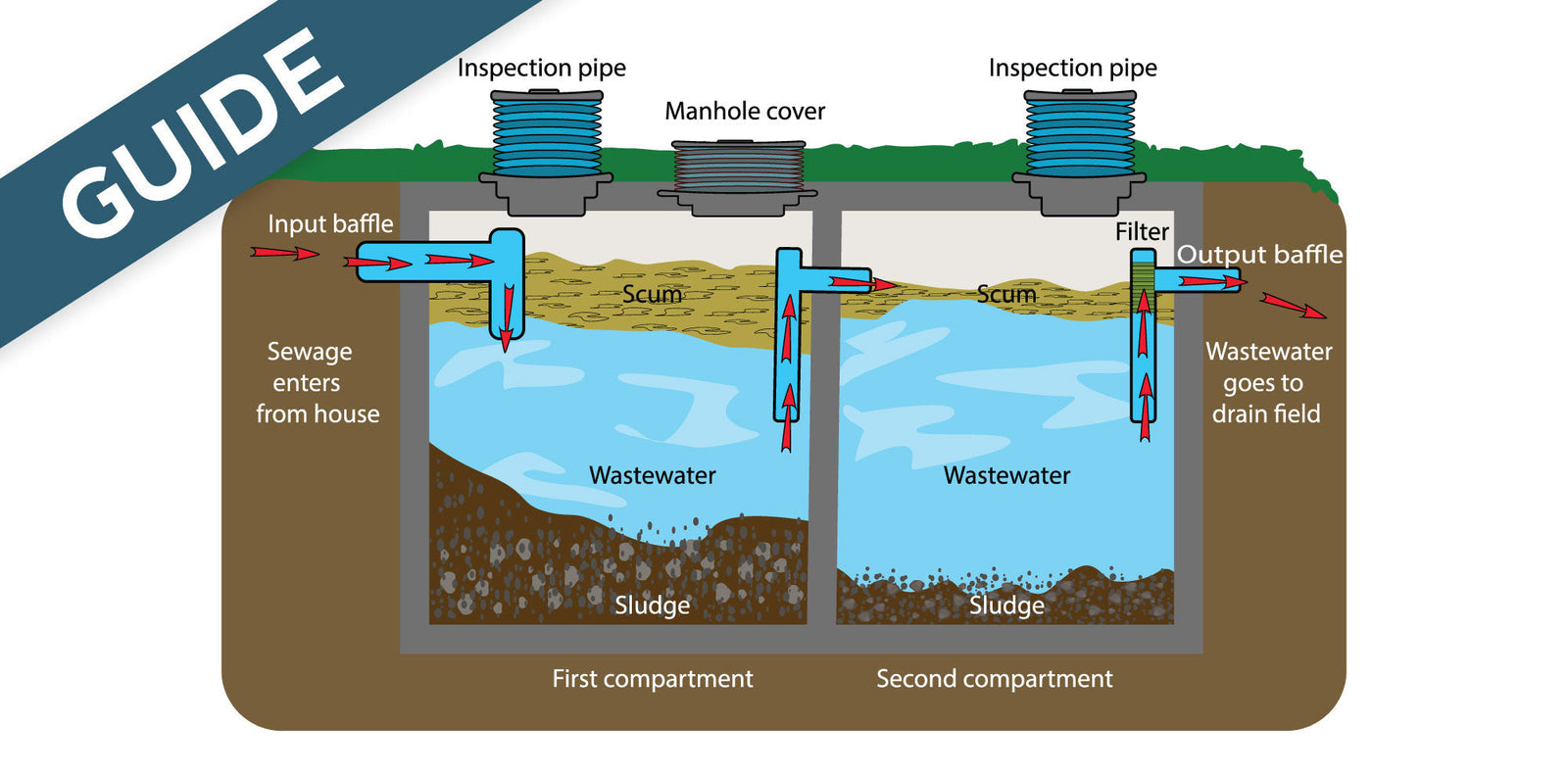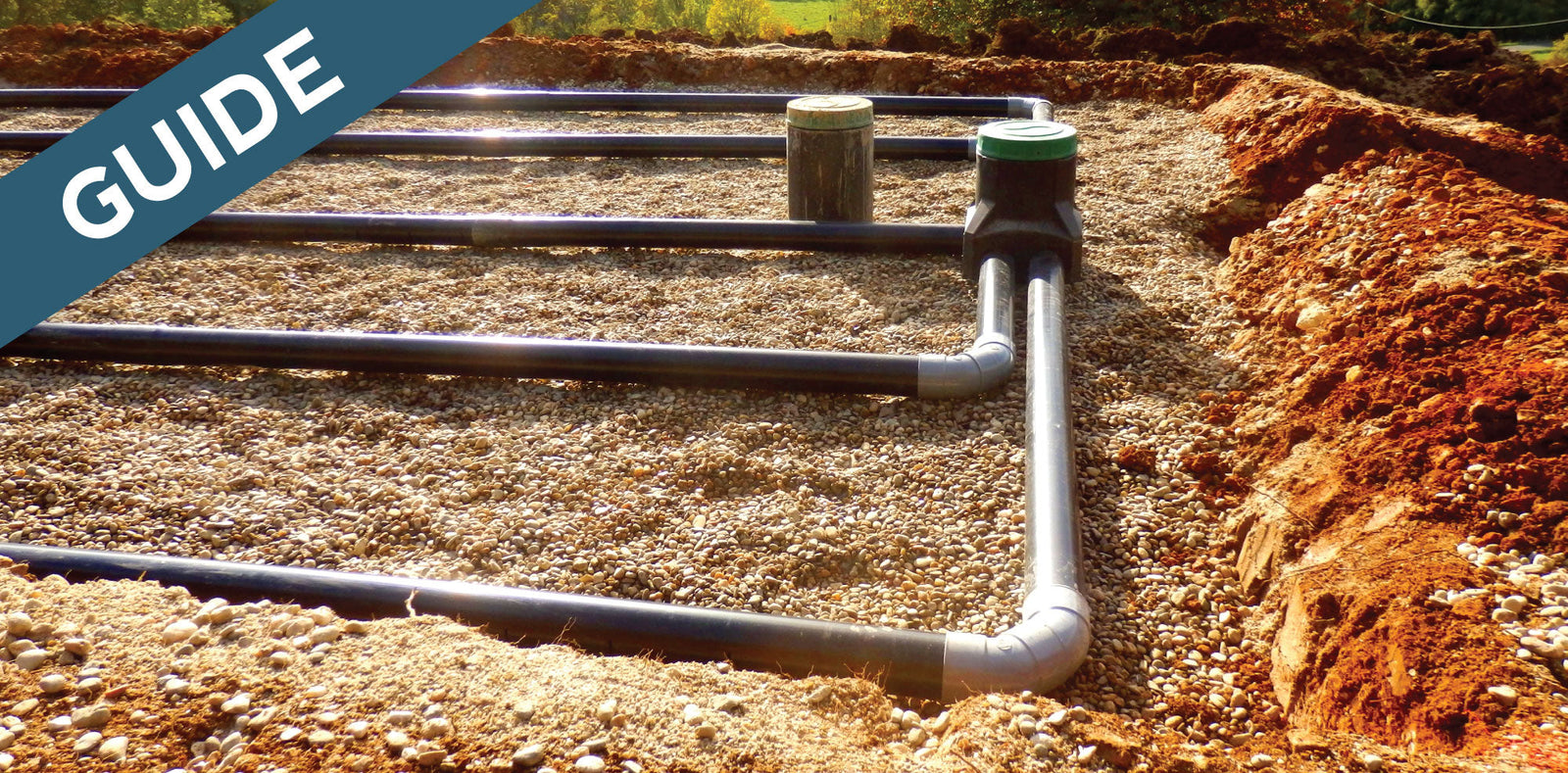Whether you're new to septic systems or have lived with them for your entire life, there are various things to know that will set you up for success when operating and treating your septic system. There can be a lot of nuance in each septic system, so yours might be a bit different depending on your situation. In general, though, it always helps to have a basic understanding of septic systems, plumbing, and everything in between under your belt!
Below we've outlined some of the most frequently asked questions about septic systems that we get, as well as some popular topics that people are interested in. You can jump to each section by clicking a topic on the list below. If there is something you'd like to see added to this list or if you are needing additional help, please don't hesitate to reach out to us at support@uniquemm.com. We are always very happy to help!
Let's explore some foundational concepts about your septic system together!
Contents
- What Is A Septic System?
- How Does A Septic System Work?
- What Kinds Of Septic Systems Are There?
- How Do I Determine If I Am On A Septic System? And If So, What Type?
- How To Care For Your Septic System Safely
- Pumping Out Your Septic System
- What If I Don’t Pump My System?
- How Do I Treat My Septic System?
- Is It Necessary To Treat My System?
- Can I Damage My Septic System?
- How Long Will My Septic System Last?
- Common Questions
- Septic Systems Near A Well
- Do I Have To Pump My System? What Happens If I Don’t?
- Do I Have To Treat My Septic System? My Pumper / Neighbor Says I Don’t Have To. What Happens If I Don’t?
- Can I Damage My Septic System?
- Can I Overuse My Septic System?
- Do I Need To Use Special Toilet Paper For My Home On A Septic System?
- Can I Plant A Garden On Top Of My Septic Field?
- How Gray Water Systems Work
- Treating A Gray Water System
What Is A Septic System?
A septic system is a type of home wastewater system. Unlike sewer systems that feed into a larger wastewater system, septic systems are entirely self-contained and do not feed into a larger sewer network.
How Does A Septic System Work (Septic Tank + Field)?
A septic system is designed pretty simply. It normally consists of a septic tank and a lateral line system or leach field, but there are a few other designs out there. Learn more about these less common types of systems by touching or clicking here.
The septic tank itself is generally made of concrete and holds on average a volume of 1,500 gallons. The septic tank is the first stop for your waste after it leaves your home by being flushed down a toilet or washed down a drain. Once your waste enters the tank, the beneficial bacteria inside your tank begin to break it down. During the breakdown process, waste is separated into scum and sludge.
The scum layer generally floats to the top of the tank and consists mostly of fats, oils, and grease. On the other hand, the sludge layer generally sinks to the bottom of the tank. For the most part, it's made up of proteins, carbohydrates, and undigested solids. After the scum and sludge have been separated, the remaining wastewater flows out of the septic tank and into the septic field (or leach field). The septic field is generally a large space (typically in your backyard) where several lateral lines are buried under the ground and extend out from the septic tank.
The lateral lines are long pieces of tubing, typically made of PVC, that are perforated with small holes. The lateral lines normally have a layer of gravel between them and the native soil below. The liquid from the septic system runs through these lateral lines and seeps out through the small holes. A substance called biomat builds up around these exit holes. Biomat also contains bacteria that continue to break down any remaining waste that might be left in the wastewater from your septic tank.
Once the liquid exits through the lateral lines and passes through the biomat layer, it seeps (or "leaches") into the soil and eventually makes its way back into the groundwater as clean water.
What Kinds Of Septic Systems are there?
There are several types of septic systems out there. Knowing the type of septic system you have will help you keep things clean and flowing.
Septic Tank + Field
The majority of septic systems installed are septic tank + field. This is the type of system we've been talking about so far in this article. As mentioned, this type of system works by collecting the waste in a large septic tank where beneficial bacteria break down the waste, separating it into scum, sludge, and leftover wastewater liquid. The scum and sludge remain in the tank while the wastewater flows out into the septic field, where it's dispersed back into the ground water as clean water.
Septic Tank + Seepage Pit
With this type of system, the waste is collected in a large tank where bacterial processes break down the waste and separate it into scum, sludge, and wastewater. The scum and sludge remain in the tank while the liquid waste flows out into a large seepage pit. This pit has a series of perforations in it that allow the liquid to flow out and into the ground.
The main difference between this system and a traditional septic system is that a seepage pit allows the liquid to seep deeper into the ground instead of across a large field like in a traditional septic system. These systems are best suited for homeowners who do not have large amounts of open space where a septic field could be installed.
Septic Tank + Lagoon
In a septic system that feeds out into a lagoon, the waste is collected in a large septic tank where the bacteria break the waste down - just like other systems. However, when the liquid waste exits the tank, it flows out into a lagoon or pond-like body of water.
Aerobic System
Aerobic systems pump oxygen into a waste tank to increase the activity of aerobic bacteria. Without this oxygen influx, a normal septic system will have increased activity of anaerobic bacteria (aka "bad" bacteria that stink). Anaerobic bacteria are often less efficient than their aerobic cousins. In the big picture, this means that the effluent (or the wastewater that flows out of the septic tank) from an aerobic system is significantly “cleaner” than the effluent from a regular septic system. Cleaner effluent means that the drain field won't have to perform as much filtration, which means that you might not have to do as much maintenance on your system as a whole. To learn a lot more about Aerobic systems, touch or click here.
How Do I Determine If I Am On A Septic System? And If So, What Type?
If you are not sure if you have a septic system operating or not, there are a few things that might indicate that you do indeed have a septic system. Here are some common indicators:
- Do you live in a rural location? Many rural locations do not tie into sewer system, so individual septic systems tend to be more popular in rural locations.
- Are there any visible lids or risers in your backyard or fields around your home? These are typically access points to your septic tank and can also be indicators of a septic system.
- Can you see a stand pipe in your backyard/field? This pipe is also an indicator that there is a septic system tied into your home plumbing.
- Are you on a well? Many homes that are on a well also use a septic system as their main mode of waste removal.
All of these items can be indicators that you're on a septic system. But please note that it's considered a best practice to contact a septic inspector and schedule a property inspection. This inspection will tell you if you do indeed have a septic system and what type it is.
How To Care For Your Septic System Safely
Pumping Out Your Septic System
Over time, your septic system will fill up with waste. This waste will need to be removed from the system manually. The way this solid waste is removed is through the process of pumping. We recommended that you hire a pumping service to pump out your septic system.
On average, a septic system needs to be pumped out every 3 years. Please also note that the pumping schedule may need to change depending on usage as well as the number of people in your household.
What If I Don’t Pump My System?
Not pumping a septic tank can lead to disastrous results. Here are just a few of the bad things that could happen: foul odors escaping from the drains in your home, drain backups, home flooding, and standing water in your septic field. This is why it's crucial to keep track of how full your tank is through personal or professional inspection!
How Do I Treat My Septic System?
It's wise to treat your septic system regularly in order to keep your system flowing and free from backups. We recommend using Unique Septic System Digester. Septic System Digester comes in a variety of different dosage methods, so touch or click here to see which method is best for your system. Using Septic System Digester on a regular basis will save you a ton of money in the long run!
Is It Necessary To Treat My System?
In an ideal world, a septic system treatment is not necessary, but unfortunately issues can indeed arise from not using a treatment method. Backups, clogs, and foul odors can result if you do not regularly treat your septic system.
Can I Damage My Septic System?
Septic systems work using a delicate bacterial balance to break down your waste. Using harmful chemicals can kill off that bacteria and bring the breakdown process to a halt, leading to backups and odors.
Not only can you damage your septic system by using improper chemicals, but it's also possible to cause issues through overuse. Overuse can vary depending on your septic system, but it's best to avoid activities that involve sending high volumes of water through your septic system in a 24-hour period.
Environmental factors can also present issues to septic system users. Tree roots can spread out and cause damage to the septic tank itself. These issues can be extremely costly, so making sure root systems are controlled around your system is crucial for septic system owners.
How Long Will My Septic System Last?
A well-built and maintained septic system should last at least 40 years or more.
Common Questions
Septic Systems Near A Well
If your system is properly constructed, it shouldn't be an issue that it's located near a well. But if you're worried about cross-contamination issues, leaks, etc., be sure to contact a septic system inspector and set up a time to have your well water tested.
Do I Have To Pump My System? What Happens If I Don’t?
Yes. You do need to pump your system. Over time, your septic system fills up with waste. This waste needs to be removed from the system manually. Otherwise, the waste will back up into your house, cause odors, and lead to other costly repairs. The way this solid waste is removed is through the process of pumping. We recommended that you hire a pumping service to pump out your septic system.
On average, a septic system needs to be pumped out every 3 years. Please also note that the pumping schedule may need to change depending on usage as well as the number of people in your household.
Do I Have To Treat My Septic System? My Pumper / Neighbor Says I Don’t Have To. What Happens If I Don’t?
It's highly recommended that you treat your system for a couple of reasons. First, treating your system regularly will extend the period between pump outs, saving you money. Second, treating your system gives you peace of mind knowing that you won’t experience any unwanted odors or slow moving water through your system.
Can I Damage My Septic System?
Septic systems work by using a very delicate balance of bacteria in your tank that break down your waste. Using harmful or caustic chemicals can kill off that bacteria and hinder the breakdown process, causing backups and odors.
Not only can you damage your septic system by using improper chemicals, but it's also possible to cause issues through overuse. Overuse can vary depending on your septic system, but it's best to avoid activities that involve sending high volumes of water through your septic system in a 24-hour period.
Environmental factors will also present issues to septic system users. Tree roots can spread out and cause damage to the septic tank itself. These issues can be extremely costly so making sure root systems are controlled is crucial to septic system owners.
Can I Overuse My Septic System?
It's possible to cause issues through overuse. Overuse can vary depending on your septic system, but it is best to avoid activities that involve sending high volumes of water through your septic system in a 24-hour period.
Do I Need To Use Special Toilet Paper For My Home On A Septic System?
Many septic system owners worry about what kind of toilet paper needs to be used in a septic system. The answer is quite simple: So long as you are using Unique Septic System Digester, you can use any toilet paper you would use in a traditional sewage system. The bacteria in Septic System Digester will break down the Toilet paper very effectively, leaving you worry-free about clogs in your septic system.
Can I Plant A Garden On Top Of My Septic Field?
Many septic system owners opt to use the water from their septic system to water their garden. This can be a very good use for that septic system water, but caution does need to be used when choosing what to plant. Avoid anything that has a deep or complicated root system. Also be sure to avoid anything that requires you to dig more than a few inches into the ground as you do not want to upset the balance of the septic system below.
It should also be noted that water from your septic system CANNOT be used to water any gardens containing any food that will be consumed. Some sources indicate that it's safe within a certain amount of feet, but here at Unique, we suggest that you avoid it altogether, simply for the sake of being overly cautious.
How Gray Water Systems Work
A grey water system gathers all the water not linked to your septic system. This water does not contain any traditional waste and comes from places like bathroom sinks, showers, bathtubs, and laundry lines (NOTE: Kitchen sinks and dish-washing lines are NOT part of the grey water system, as they contain food waste). The water from the grey water lines runs through a small filtration system then into a small holding tank, generally only large enough to hold a few gallons of water. From this holding tank, the water makes its way through a network of lateral lines and out into an abbreviated (or smaller) leach field system that operates similarly to that in the traditional septic system. The water from this grey water system is then generally used to water a garden, line of trees, etc.
Treating A Gray Water System
Treating your grey water system is a good and necessary practice in order to keep things clean and clear. We suggest that once per month you simply pour 2oz of Unique Septic System Digester down the drain found in either your bathtub or shower. Adding Septic System Digester to your grey water system will ensure a longer life out of your filtration system and will prevent any slow moving water that might occur from buildup inside the lateral lines.





